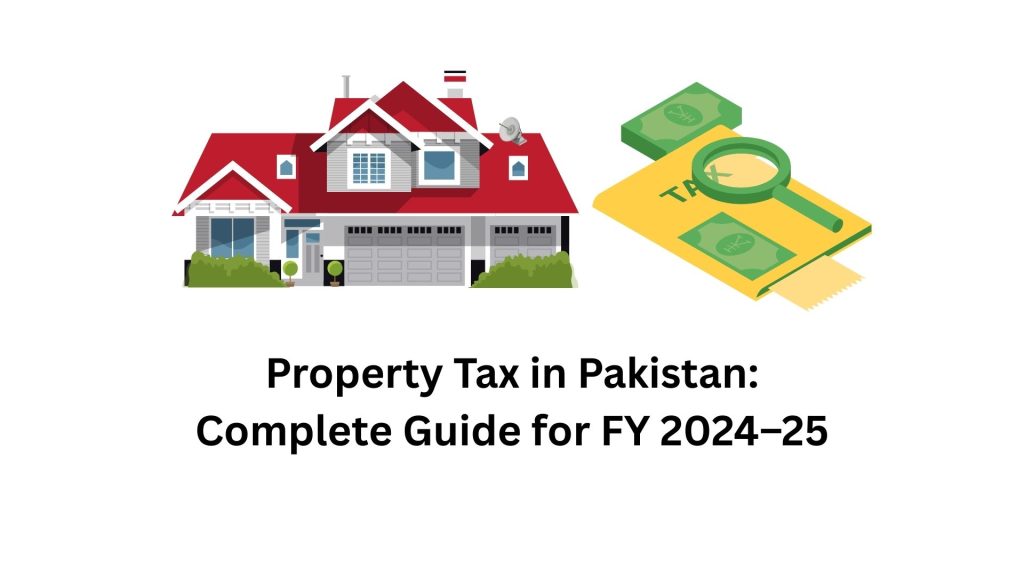
1. Taxes Applicable to Property Owners
Property owners in Pakistan are subject to several federal and provincial tax obligations, including the following:
1.1 . Capital Value Tax (CVT)
Capital Value Tax is levied annually on the fair market value of immovable property, as assessed by the Federal Board of Revenue (FBR). The current CVT rate is 2% of the fair market value of the property.
1.2 . Deemed Rental Income Tax – Section 7E
Enacted under the Finance Act, 2022, Section 7E presumes that every resident person holding immovable property (exceeding a specified value) derives notional rental income equivalent to 5% of the fair market value of such property. This notional income is subject to tax at a rate of 20%.
This provision is applicable if the aggregate fair market value of the taxpayer’s immovable property exceeds PKR 25 million, subject to specified exemptions. The implementation and valuation methodology of Section 7E have been a subject of legal scrutiny and procedural challenges.
1.3. Rental Income Tax
Rental income in Pakistan is taxable and governed by progressive slab rates. The taxation framework includes:
- Withholding Tax (WHT): Ranging from 0% to 50%, based on income level and taxpayer’s filing status.
- Final Tax Liability: Varies from 0% to 45%, depending on total rental income.
Taxpayers must ensure compliance by declaring actual rental income in their annual returns and retaining necessary rental agreements and receipts.
1.4. Urban Immovable Property Tax (UIPT)
Urban Immovable Property Tax is a provincial levy imposed on ownership or occupation of real estate located within urban areas. The proceeds are utilized to fund municipal services. Rates and collection procedures vary by province and municipal jurisdiction.
1.5. Agricultural Income Tax
Although agricultural income is constitutionally exempt from federal taxation, it is taxable under provincial legislation. Tax regimes vary as follows:
- Punjab: Income up to PKR 400,000 is exempt. Higher incomes are taxed per provincial slabs.
- Sindh & Khyber Pakhtunkhwa: Income up to PKR 600,000 is exempt. Above this threshold, applicable slab rates are imposed.
Taxpayers engaged in agricultural activities are required to declare such income under the respective provincial tax statutes.
For any assistance with Property taxation, reach out on WhatsApp, visit our website or fill out the contact form at the end of the article, we’ll get back to you soon!
2. Taxation on Sale of Immovable Property
2..1. Capital Gains Tax (CGT)
CGT is imposed on profits realized from the disposal of immovable property within a defined holding period. The rate structure is:
- Properties acquired before June 30, 2024: A sliding scale applies — starting from 15% in the first year, decreasing annually by 2.5%, becoming nil after six years.
- Properties acquired on or after July 1, 2024: A flat CGT rate of 15% applies irrespective of the holding period.
2. 2. Advance Tax under Section 236C
Advance tax under Section 236C is collected by the registrar at the time of property transfer. The applicable tax rates, effective from July 1, 2024, to June 30, 2025, are as follows:
| Property Value (PKR) | Filer | Late Filer | Non-Filer |
| Up to 50 Million | 3% | 6% | 10% |
| 50M – 100 Million | 3.5% | 7% | 10% |
| Over 100 Million | 4% | 8% | 10% |
3. Taxation on Purchase of Property
3.1. Advance Tax under Section 236K
Purchasers of immovable property are required to pay advance income tax under Section 236K. The applicable rates, effective FY 2024–25, are:
| Property Value (PKR) | Filer | Late Filer | Non-Filer |
| Up to 50 Million | 3% | 6% | 12% |
| 50M – 100 Million | 3.5% | 7% | 16% |
| Over 100 Million | 4% | 8% | 20% |
Note: Payments exceeding PKR 5 million must be routed through banking channels in accordance with Section 75A of the Income Tax Ordinance, 2001.
4. Adjustable vs. Non-Adjustable Taxes
It is essential to distinguish between adjustable taxes (claimable against final tax liability) and non-adjustable taxes (non-refundable transactional costs).
4.1. Adjustable Taxes
These include:
- Advance Tax under Sections 236C and 236K
- Capital Gains Tax (CGT)
Illustration:
If Mr. Ali acquires property in 2023 for PKR 10 million and disposes of it in 2025 for PKR 12 million:
- Capital Gain: PKR 2 million
- CGT Rate: 12.5%
- CGT Payable: PKR 250,000
- Advance WHT paid: PKR 360,000 (3% of PKR 12M)
Mr. Ali may claim a refund of the excess amount (PKR 110,000) by filing a proper income tax return.
Note: Advance tax under Section 236C may become a minimum tax if the taxpayer acquires another property within the same tax year.
4.2. Non-Adjustable Taxes
These are mandatory transactional fees and are not creditable against income tax. Examples include:
- Stamp Duty – Levied on property documentation; rate varies by province.
- Registration Fee – Charged for registration of property transfer.
- Local Government Levies – Imposed by municipal authorities (including cantonments).
5. Strategies for Legal Tax Compliance and Savings
To lawfully minimize tax liability and ensure compliance, taxpayers are advised to:
- Accurately Assess Market Value: Ensure that transactions reflect FBR or DC notified values to avoid disputes.
- Maintain Documentation: Preserve sale deeds, purchase receipts, valuation reports, and tax challans.
- Utilize Banking Channels: In line with Section 75A for high-value transactions.
- Declare Income on Accrual Basis: Property income is generally taxable on accrual regardless of actual receipt.
- Become an Active Filer: Filing annual returns helps avoid higher rates and enables refunds or adjustments.
- Seek Professional Tax Assistance: Professional advice helps in optimizing compliance and financial outcomes.
6. Frequently asked questions related to Property taxation
What are the total taxes on purchasing property in Pakistan?
Approximately 5%–10% of the transaction value, comprising CVT, advance tax (236K), stamp duty, and registration fee, depending on filer status and location.
Is property tax paid annually?
Yes. Urban Immovable Property Tax is payable on an annual basis to local authorities.
How can I legally reduce my property tax burden?
By becoming a filer, maintaining documentation, ensuring valuation compliance, and adjusting applicable taxes in your return.
Is rental income taxable in Pakistan?
Yes. Rental income is taxable under progressive slabs and subject to withholding tax. It must be declared in annual income tax returns.
Do non-filers pay more tax?
Yes. Non-filers are subject to significantly higher rates on both purchase and sale transactions and do not qualify for refund or adjustment claims.
Conclusion
Understanding the legal framework governing property and income taxation in Pakistan is essential for both compliance and strategic financial planning. Stakeholders must remain updated on evolving laws and procedural requirements. Where uncertainty persists, engaging a qualified tax advisor or legal professional is highly recommended to ensure adherence and maximize lawful benefits.
